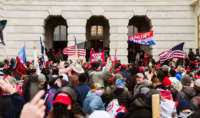
An agreement appears to have been reached between Democrats and Republicans on the formation of a 9/11-style commission to investigate the events of the January 6 breach of the Capitol. But not some — including House Minority Leader Kevin McCarthy (R-California) — are not yet on board with the plan.
Rep. Bennie Thompson (D-Mississippi) and Rep. John Katko (R-New York), the chair and ranking member, respectively, of the House Homeland Security Committee, announced the deal on Friday. The committee plans to pass legislation, which will be voted on in the Democrat-controlled House of Representatives, that will establish a 10-member commission to examine “the facts and circumstances of the January 6th attack on the Capitol as well as the influencing factors that may have provoked the attack on our democracy.”
Five members of the commission will be selected by Speaker of the House Nancy Pelosi (D-California) and Senate Majority Leader Chuck Schumer (D-New York), with the remaining five being selected by McCarthy and Senate Minority Leader Mitch McConnell (R-Kentucky), ensuring an equal number of Democrats and Republicans to be tasked with taking part in the inquiry.
“It is imperative that we seek the truth of what happened on January 6 with an independent, bipartisan 9/11-type Commission to examine and report upon the facts, causes and security relating to the terrorist mob attack,” Pelosi said in response to the bipartisan deal being reached.
Yet in spite of the breakthrough deal, McCarthy expressed hesitancy, and didn’t state whether he backed the deal yet or not. “I haven’t looked all the way through it,” he said, adding that he wanted an inquiry that included other events beyond the January 6 breach of the Capitol. McConnell has similarly expressed a desire for issues besides the January 6 attack to be examined in the inquiry.
Prior to the deal being reached, Republicans had demanded that the commission also investigate demonstrations and uprisings over the summer involving the Movement for Black Lives, even though those events had nothing to do with the attempt by a mob of loyalists to former President Donald Trump to halt the certification of the Electoral College in January.
Dozens of Trump supporters, upset that Congress was about to certify the 2020 presidential election win by Joe Biden, forced their way into the building, resulting in five individuals dying and hundreds of others being injured.
Trump’s comments earlier on January 6, in which he encouraged his supporters to go to Congress to express their contempt (adding that they’d “never take back our country with weakness”), were seen by many as provoking the violence that was seen. Trump was impeached weeks later, with the Senate failing to convict him, though a majority of senators did vote in favor of his indictment.
It’s likely, given the scope of the commission’s duties, that Trump’s involvement in the day’s events, as well as his encouraging his supporters to come to Washington D.C. that day, will receive a deep examination.
The commission’s formation does not technically need McCarthy’s endorsement — if it can pass the House Homeland Security Committee, it will reach the House floor for a full vote, where the Democrat-controlled chamber is expected to support it. Less clear is how much support the commission might get in the Senate, where its formation could be blocked by a filibuster if it doesn’t have the support of at least 10 Republicans.
This post was originally published on Latest – Truthout.